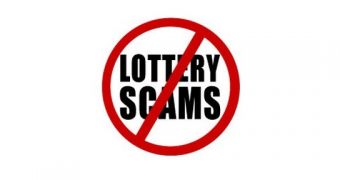In March, 41-year-old Neil Trotter, a car mechanic from the United Kingdom, won £107.9 million ($200 million) in the EuroMillions lottery. Scammers have already started sending out emails claiming that the man is giving away his winnings.
Hoax Slayer has come across two types of emails leveraging the story of Neil Trotter. One of them reads something like this:
“Mr. Neil Trotter gave you part of his lottery winnings as charity, Please respond to this email with your name, address and phone number. See link for proof: [link to legitimate BBC article].”
The second one contains more details and purports to come from Trotter himself:
“Perfect Grettings,
My name is Neil Trotter the current winner of £108 million Pounds on the just concluded Euromillion Jackpot Draw for 2014,and i bring to you a perfect good news for such a perfect timing as this. I know this is surprising for you to have received this at this very early stage.
But because i just received the cheque on Friday 14th of March 2014 and i am excited, so i am willing to donate £1,000,000(One Million Great Britain Pounds)to you and as part of my effort to alleviate poverty and care for the less priveledged around the world,i have decided to donate to just 15 people around the globe which you are a part of. so do get back to us quickly via email at: [email protected]
Perfect Regards. Neil Trotter.”
The email might include “perfect” greetings, but this is far from being a perfect scam. While some lottery winners have donated a lot of money to charity, you can rest assured that no one will start sending out poorly written emails to random email addresses offering a lot of money.
Those who respond to the scammy emails are asked to hand over personal and possibly even some financial information. In later stages of the scheme, victims are asked to pay some “fees” that are allegedly needed to complete the transfer of the money.
Because victims are usually instructed to wire the money via Western Union or Money Gram, the con artists can disappear without a trace. However, it’s worth noting that the scammers usually ask for more than one payment. In many cases, they push for more money until the victim realizes that it’s a scam.
Some people are known to have lost hundreds of thousands of dollars in such schemes. Beware of any “offers” that sound too good to be true.

 14 DAY TRIAL //
14 DAY TRIAL //